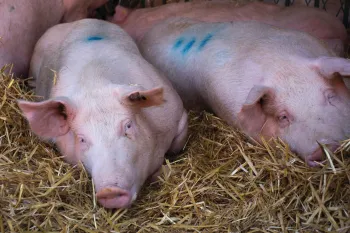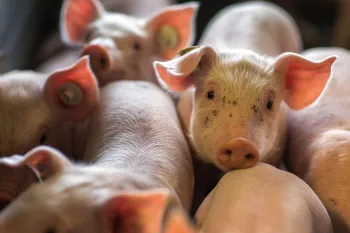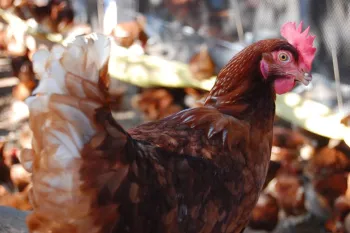SÃO PAULO—In April, Humane World for Animals Brazil, formerly called Humane Society International Brazil, hosted a three-part webinar series to advance sow welfare in Brazil. The series brought together animal welfare experts, veterinarians, academics, and industry professionals to share strategies for improving conditions for sows in commercial production and to advocate for a global transition to higher welfare group housing systems.
The webinar series also marked the launch of Humane World for Animals’ newly updated report, The Business Case for Preimplantation Group Housing. Drawing on scientific evidence, regulatory and market trends, and case studies from pig producers, the report provides in-depth analysis and guidance to help producers, food companies and financial institutions make the transition from the use of gestation crates to preimplantation group housing systems, where sows are kept in stalls for no more than 7 days, as opposed to other group housing formats where confinement lasts for 28-42 days.
“This event was about more than just production systems—it was about reimagining how we treat animals in the food system,” said Anna Souza, senior program manager for Humane World for Animals. “The shift away from gestation crates to group housing is not only a scientific and ethical imperative, but also a smart business decision. Our new report provides a clear case for why better welfare for sows aligns with better outcomes for producers, food companies, and investors.”
Speakers addressed a range of topics during the webinar, including the ethical and scientific concerns surrounding gestation crates. Dr. Adroaldo Zanella, full professor at the University of São Paulo, highlighted the behavioral and physiological impacts of confinement. “Sows kept in individual gestation crates exhibit abnormal and stereotypical behavior, reduced muscle mass and bone strength, and changes in the brain systems responsible for positive sensations,” Dr. Zanella explained.
José Rivera Ulloa, technical manager in animal nutrition at Alzchem, shared his experience in the region: “Talking to producers in Mexico, Colombia, Ecuador and other Latin American countries, I noticed that producers who did the math saw that they did not necessarily increase the cost of production nor worsen the efficiency of the system when implementing group housing. There is still a lot of resistance from the industry, but it is not necessarily a more expensive or less efficient system.”
Additional sessions covered reproductive management, lameness mitigation, genetic trends in breeding, housing alternatives, and welfare-focused approaches to sow removal and euthanasia. Throughout the series, participants engaged in meaningful discussion and provided actionable strategies for supporting the global shift away from gestation crates toward more humane housing systems, such as preimplantation group housing for pregnant sows.
Watch the full webinar recordings:
- Session 1: https://www.youtube.com/watch?v=IRcKuDKSWrw
- Session 2: https://www.youtube.com/watch?v=e7xoHKBNqVE
- Session 3: https://www.youtube.com/watch?v=pf5gZ0c75Jg


